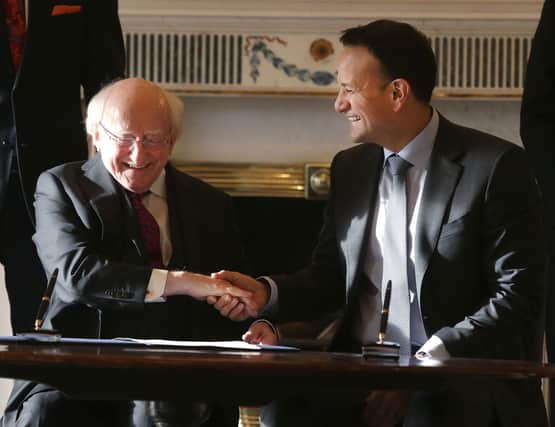Ben Lowry: Leo Varadkar's nationalism was a reminder why Northern Ireland still needs the two-state solution


When he did so, Michael D Higgins had been president of the country for more than five years.
Both men have symbolised a shade of mainstream Irish nationalism that can be assertive and unafraid of scolding Britain.
Advertisement
Hide AdAdvertisement
Hide AdThis new nationalist confidence, which has happened in addition to the rise of Sinn Fein, has left many unionists confused about how to respond. Some want to stand firm on policies that damage the Union, others want to concede small things to nationalism to win their goodwill and support for staying in the UK.
The latter approach explains why you will now hear some unionists talking warmly about Gaelic games and culture. It also explains why you often see interviews or discussions with unionists in which, often in response to leading questions, they are at pains to emphasises their niceness, moderation and open mindedness.
Such an apologetic demeanour implies acceptance of a nationalist assessment of unionists: that they, unionists, must change. But unionists could just as plausibly say that in fact it is nationalism that needs to change. Both Mr Varadkar and Mr Higgins have held high office at a time when nationalist Ireland has seemed to embrace republican ideas such as justifying past IRA terrorism, refusing to consider joining the Commonwealth or changing the Irish flag or national anthem, even if it is the price of achieving their goal of an all Ireland.
Consider also how the ‘Ooh ah up the Ra’ chant, that has swept young people across this island, something that would have been unthinkable when IRA terror was actually ongoing and opposed by most nationalist voters, overwhelmingly so south of the border.
Advertisement
Hide AdAdvertisement
Hide AdMr Varadkar was head of the Irish government when it was brazen enough to sue to the UK over its plans to deal with the legacy of the Troubles over its amnesty element, when Ireland itself has a de facto amnesty for the IRA. Ireland has also evaded examination for its own role in the bloodshed, by refusing to extradite terrorists who tried to hide in their jurisdiction.
He was to the fore in ensuring that any UK-Ireland trade barrier after Brexit was in the Irish Sea, repeatedly scolding London for its ‘unrealistic’ proposals to resolve the dispute when in fact Mr Varadkar had been intransigent in his rejection of any change whatsoever at the land border.
Mr Varadkar was Taoiseach when his Fine Gael colleague Simon Coveney tore up the three strands alongside the then NI Secretary Julian Smith in the deal to restore Stormont in 2020. This came after both Mr Varadkar and Mr Coveney had told us that the province needed an Irish language – a matter that should be the domain of NI politicians alone.
The emergence of an Irish leader like such as Mr Varadkar, who is not the stereotype of a Catholic Irish nationalist politician, being an ethnic minority and being open about his same-sex sexual orientation, fuelled unionist confusion. It made us think that the movement of such traditional nationalism away from Catholic orthodoxy meant it might move away from nationalism itself.
Advertisement
Hide AdAdvertisement
Hide AdIf anything the opposite has been happening, and Professor John Wilson Foster, the literary academic from Northern Ireland who has spent much of his career in Canada, has a theory as to why. He has observed a parallel between Northern Ireland Ireland and Quebec in which nationalism has actually increased when the Catholic Church has declined. In both regions, Catholic church attendance levels were over 90% in the 1960s but have since plunged to under 25%. Yet in 1995, amidst falling Mass attendance, Quebec voted to within a whisker of leaving Canada (50.6% to 49.4%).
The same, he observes, is happening in Ireland. The influence of the Catholic Church has plunged and yet Irish nationalism has risen (Prof Wilson has just launched a book ‘Ireland out of England – and other inconveniences’ which examines the success of many Irish people in Great Britain amidst anti-British feeling back home in Ireland).
Like many unionists, I reached the wrong conclusion when I watched the old traditional Catholic Irish order beginning to collapse 20 years ago, and assumed it meant that much of the division between the two main communities on the island would dissolve.
It is not only Mr Varadkar who has been suited to this time of rising anti-British feeling, but so too has been President Higgins. The web version of this article will link to a 2022 essay I wrote listing his criticisms of Britain and unionists, and his apparent belief that Ireland has always been the wronged party in its relationship with Britain (‘Surprise us President Higgins, say something nice about Britain,’ February 2022).
Advertisement
Hide AdAdvertisement
Hide AdHe boycotted the 2021 Northern Ireland centenary service because he thought it was a celebration of partition. In reality, that occasion in Armagh was so denuded of any meaning, in order to placate nationalist sensitivities, that it ended up being an insult to unionists – in which the name of Northern Ireland was barely spoken, let alone celebrated. Yet it was still too much for President Higgins.
Given that the gulf between unionists and nationalists on matters such as history is if anything growing I am as convinced as I have ever been that we need to maintain the two-state political solution to the division on this island, in which Northern Ireland stays in the UK as a neighbour to the Republic of Ireland. Two different worldviews and two different sets of cultures in two different but friendly states.